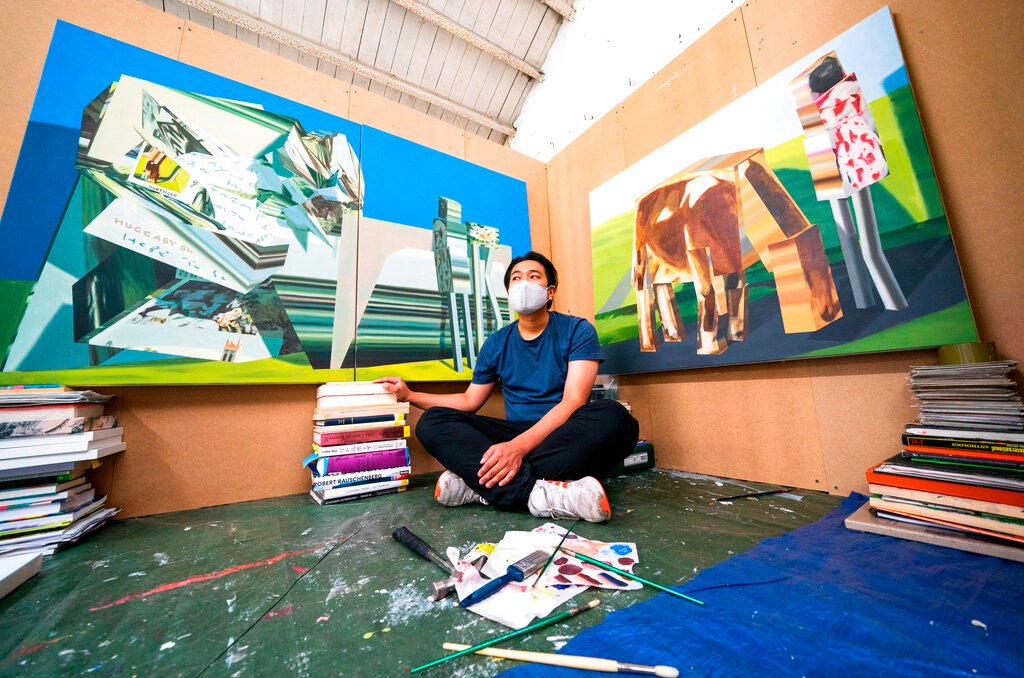 Glasgow School of Art Student Masaki Ishikawa in his installation Home Studio at The Glue Factory in Glasgow, which forms part of the Glasgow School of Art MFA exhibition “Hot Wheels,” 2021. Jane Barlow/PA Wire, Press Association via AP Images
Glasgow School of Art Student Masaki Ishikawa in his installation Home Studio at The Glue Factory in Glasgow, which forms part of the Glasgow School of Art MFA exhibition “Hot Wheels,” 2021. Jane Barlow/PA Wire, Press Association via AP Images
To receive Morning Links in your inbox every weekday, sign up for our Breakfast with ARTnews newsletter.
The Headlines
ONE MUSEUM LEADER IS OUT, AND ANOTHER IS IN. The closely watched curator Stefan Kalmár is stepping down after five years as director of the Institute of Contemporary Arts in London, ARTnews reports. “The moment now feels right for me to hand over to the next generation to lead,” Kalmár said in a statement. He plans to live between Berlin and Marseille, France, where he helped organize the 2020 edition of Manifesta. Meanwhile, in New York, the International Center of Photography has tapped David E. Little to be its director. Little comes from the Mead Art Museum at Amherst College in Massachusetts, where he is director and chief curator, and he takes the place of Mark Lubell, who announced his departure in March. Lubell led the organization through topsy-turvy years that included a 2016 relocation from Midtown to a $23.5 million Bowery space, which it decided to sell a year later to move to Essex Crossing. It opened there in January 2020, just before the coronavirus hit New York.
THE LATEST FROM THE COVID LEGAL BATTLEFIELD: Students at the Glasgow School of Art in Scotland are planning a legal challenge against the school, arguing that it did not offer them adequate access to its facilities during the first lockdown, according to Architects’ Journal . The artists said in a statement that the school “failed to deliver the education they promised and kept thousands of pounds in student fees.” They’re asking for some fees to be refunded or for a restructuring of ongoing teaching so that they can have additional time in their studios. A GSA rep told the publication that the school had reviewed the complaints and that the petitioners can now ask “the independent Scottish Public Services Ombudsman to review the matter.”
The Digest
Hong Kong artist Wong Ping, a maker of eye-grabbing and darkly comic cartoon videos, is “interested in something that’s a mixture of weirdness and the real world, or something out of this world happening in real society,” he told Alex Greenberger in a digital studio visit. Ping’s first U.S. survey is on at the New Museum in New York right now. [ARTnews]
In Finland, researchers believe that they have uncovered the remains of a nonbinary person who held an esteemed position some 1,000 years ago. An analysis of their DNA and burial artifacts has complicated understandings of the rigid gender roles that are believed to have been in place at the time. [USA Today]
The Kaneko art space in Omaha, Nebraska, suffered what it said was “significant damage” from flash flooding in the area over the weekend, though no artwork was harmed. It expects it will take at least a month to complete necessary repair work. [KMTV/News Now Omaha]
The gold 1933 Double Eagle coin that shoe kingpin Stuart Weitzman sold earlier this year at Sotheby’s for $18.9 million—the most ever paid for a coin at auction—is on view through Saturday at the World’s Fair of Money in Rosemont, Illinois, just outside Chicago. Its buyer has not been revealed. [Daily Herald]
Topeka, Kansas’s Evel Knievel Museum, which celebrates the life of that death-defying motorcycle stunt rider, is nearing a deal to move to the Las Vegas Arts District. “This museum deserves to be in a tourism destination, and we don’t think anyone would question that Las Vegas makes the most sense,” its cofounder, Mike Patterson, said. [Las Vegas Review-Journal]
One of the (disturbingly large number of) digital Vincent van Gogh shows, Immersive Van Gogh, is collaborating with the cannabis purveyor Happy Munky to host two presentations of the exhibition at which visitors can eat or smoke weed. It’s being marketed as “high-end art meets high-end cannabis hospitality.” [Page Six]
The Kicker
A DEATHLY DISCOVERY IN THE UNITED KINGDOM: Archaeologists believe that an ancient bronze key handle, dug up in Leicester, England, indicates that executions in Roman Britain sometimes involved lions, BBC News reports. The artifact shows that mighty animal attacking a “barbarian,” as well four boys who look fairly uncomfortable with the violence. The University of Leicester Archaeological Services found the quite evocative piece in 2017, and scholars have just published their findings in the journal Britannia . The ULAS’s Nick Cooper said that being condemned to be killed by wild beasts “was slightly worse than being condemned to the mines, which is the other way that prisoners often met their end.” If you say so! [BBC News]
Source link : https://www.artnews.com/art-news/news/glasgow-school-of-art-covid-disruptions-icp-new-director-morning-links-1234601307












